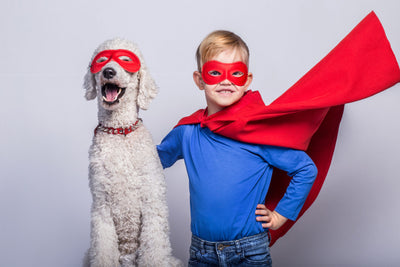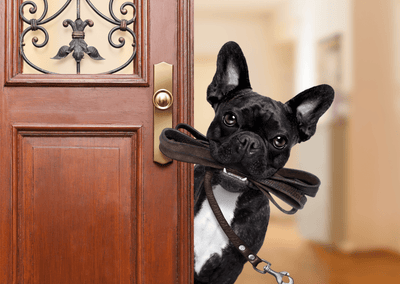We are living in a complicated health period where, as in the past, animals can occupy a prominent place and help humans in their fight against Covid 19. Valérie Maumon, the founder of the company ELEMENT.vet explains her motivations and her support for the Nosaïs project:
" ELEMENT.vet could not remain a spectator without helping this French initiative led by my friend Dominique Grandjean and his team. We share the same passion for working dogs and when Dominique told me about his project I immediately found great and ambitious initiative. But ambition is needed today in the face of the world we live in, in the face of this new challenge. Getting help from dogs, what a great idea to save the world in which the animal still doesn't have the place it should have for me.
We have the will, ambition too, heart and a sense of friendship too, so I thought about how to help Nosaïs with our means and our know-how. Relaying and collecting donations on our online store, on our demonstrations and organized events, seemed to me to be a good start, because we must all feel concerned!
And if the animal saved the man once again, I want to make the DREAM of it!

Dominique Grandjean (Professor at the National Veterinary School of Alfort and head of the Paris Fire Department Veterinary Service) and his Nosaïs team.
Congratulations to: Lesko, Maïka, Guess, Gun, Ombra, Nash, Onda, Nikita, Asko, Inti, Orezza, Fidjie, Loki, Jet, Bruce, Oslo...
You are our heroes!
Photo credit: Bruno Vigneron

Dominique explains this project to us, the training of the dogs and the progress of the study... "In practice, we collaborate with hospitals, where axillary sweat samples are taken - under the armpits - from patients who have tested positive for cotton balls are placed under their arms for a few minutes, before being locked up for 24 hours in airtight boxes to ensure that the samples no longer contain any viral particles.
We work with firefighter dogs accustomed to searching for missing persons, and with dogs from the company Diagnose, whose animals, trained in the detection of explosives in particular, have already integrated a catalog of several dozen specific smells.
Here, it is a question of training them to identify the characteristic smell that the Covid-19 could have . Either one more smell to the library of specific smells they have in memory.
The samples are placed in sterile jars and then in a small hatch, near the dog's favorite toy. Accompanied by his master, he comes to breathe this smell before recovering his toy. For him, sniffing out the virus becomes a game. Then, we submit a line of samples – one positive and several negatives – to the scent of the dog, who will go and sit in front of the positive sample.
https://www.instagram.com/tv/CDHKnWwK-ES/
What could be the practical applications?

"The trials are encouraging, and we should have concrete results within three weeks. Then, we will have to obtain the scientific validation of this protocol. If this method of detecting the virus works, it will make it possible to carry out mass detection of Covid-19.
A single dog could "test" several hundred people every day.
This could be deployed at airports, when landing ships, and even at the level of certain municipalities. This would complement PCR and serological tests, which are not 100% reliable, which have a high rate of false negatives.
It is a fast device, which does not require any sampling equipment, so there is no risk of shortage of reagent or swab! It's practical and it's not expensive, which also makes it an interesting asset for the screening strategy of the poorest countries, which do not have a significant capacity for biological tests. "
To date, several countries including Brazil, Belgium, Morocco or Switzerland, or even Quebec, have expressed their interest.
Things are moving:
Posted on August 28, 2020
Press release from the National Academy of Medicine and the French Veterinary Academy: Olfactory screening test for Covid-19 using trained dogs.
"The extraordinary olfactory acuity of dogs has long been used by customs to detect explosives, drugs or certain foods and by first aid teams mobilized in the event of a disaster to search for buried people. This ability is also exploited in the medical field to detect human diseases (cancer, malaria, Clostridium difficile, Parkinson's disease, etc.) or animals (bovine pestivirus, scabies).
The idea of using the smell of dogs to detect patients with Covid-19 was considered by multidisciplinary teams (veterinarians, doctors, biologists, dog caregivers) to meet the global demand for a screening test . rapid, simple, non-invasive , sensitive and specific, which can reduce the burden of medical biology laboratories. In fact, faced with the increase in requests for tests for the detection of Covid-19, the use of ′′ tracking dogs ′′ would make it possible to reduce the still too long delays in obtaining screening by RT-PCR, in particular in suspected cases and contacts.
The National Academy of Medicine and the French Veterinary Academy recommend:
– to complete the scientific evaluation and the development of this new test in order to implement it as soon as possible:
– to specify the analytical performances (sensitivity, specificity);
– to identify in the volatiloma the specific molecule(s) of Covid-19;
– promote the creation of dedicated teams (staff, dogs);
– to secure the presentation of the samples to be analyzed, both for the dogs and for the staff;
– and to define the rules for the proper use of this type of test.





